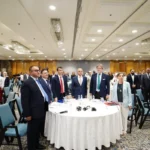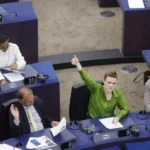The investigating judge who substituted Michel Claise in the Qatargate affair, Aurélie Dejaiffe, requested the federal prosecutor, Raphael Malagnini, on 24 October to order the revocation of the immunity of the Belgian MEP Maria Arena. A request to which Malagnini answered a month later, on 28 November, discussing the uselessness of such a move, by Arena’s Belgian nationality.
The question arises concerning the prosecutor’s delay in immediately responding to the federal judge’s request, especially as the immunity of Eva Kaili was swiftly revoked. This discrepancy highlights the double standard and bias of Belgian investigators.
Furthermore, the same rationale was not applied in the case of Marc Tarabella, who is also Belgian and implicated based solely on the statements of Pier Antonio Panzeri, the “repentant” whom the prosecutor claims not to believe. Not only that, but this request signifies a genuine anomaly, as it is unnecessary for the judge to seek authorization from the prosecutor’s office.
A reversal of roles coincided with another event: on October 25th, one day after Dejaffe’s letter, Malagnini announced his departure from the federal prosecutor’s office. He left the case to assume the role assigned to him by the Superior Council of Justice of Belgium, that of a labor auditor in Liège.
The letter sent by Dejaffe to Malagnini is among the numerous documents included in the four boxes of documents within the investigation file. These documents were included after the audio scandal brought forth by the defense of Francesco Giorgi, who is Panzeri’s former right-hand man and the husband of former vice-president Eva Kaili, to the prosecutor’s office. In the audio, the main investigator of the affair not only admits that he does not believe Panzeri but also acknowledges that he has omitted many documents useful for the defense from the file. These developments raise suspicions and controversies regarding the conduct of Belgian authorities.
These scenarios illustrate a further disparity in the treatment by Belgian authorities compared to that reserved for other suspects. Those suspects were imprisoned based on unverified statements and the discovery of cash sums. What sets these cases apart is the presence of money; in Tarabella’s case, however, the police did not find even a cent.
Furthermore, Claise’s resignation exactly one month ago occurred after Tarabella’s defense revealed the connection between the magistrate’s son and Arena’s son, who are partners in a company that markets legal cannabis. The conflict of interest is evident, leading the judge to step down. This action clearly indicates an awareness of irregularities, biases, and errors made by the Belgian authorities in the case.
These developments and ongoing leaks compromise the fairness of the judicial process and violate fundamental rights. Individuals with evidence have been targeted by Belgian authorities, indicating a bias from the start where some are favored while others face strict actions without evidence.






